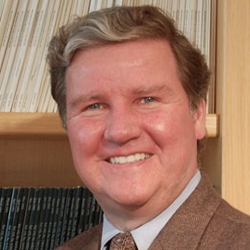Health E-Insights
An Interview with Dr. Ian Cook
Dr. Ian Cook, M.D., is a senior medical advisor to NeuroSigma and one of the inventors of Trigeminal Nerve Stimulation. Dr. Cook is also a professor of psychiatry and biobehavioral sciences at UCLA and director of the UCLA depression research & clinic program. NeuroSigma, Inc. is a Los Angeles-based medical device company.

By: Sheldon Baker

Dr. Ian Cook, M.D., is a senior medical advisor to NeuroSigma and one of the inventors of Trigeminal Nerve Stimulation. Dr. Cook is also a professor of psychiatry and biobehavioral sciences at UCLA and director of the UCLA depression research & clinic program. NeuroSigma, Inc. is a Los Angeles-based medical device company. The website is: http://www.neurosigma.com/.
Health E-Insights: How serious is depression in Americans today?
Dr. Cook: Major Depression (clinical depression) is common and disabling. Beyond the sadness that gives the disorder its name, there are impairments in concentration, decision making, sleep, energy and anxiety. Over 20 million Americans will have major depression this year, and one in six will have it at some point in their lives. About every 14 minutes, someone in the US dies from suicide, most from mood disorders. In the years prior to the recession, American business lost over $40 billion each year due to disability from major depression, and costs of care added another $40 billion-plus.
Health E-Insights: Does it lead to other illnesses?
Dr. Cook: Depression worsens the outcome for many other illnesses. For example, people who have a heart attack and have depression are much more likely to die within a year than those not depressed. Treatment results are poorer in diabetes, AIDS, cancer, and many other serious illnesses.
Health E-Insights: Have economic woes lead to increased depression in the U.S.?
Dr. Cook: Anything that adds to stress has potential for increasing the risk of depression, at least in some people. The CDC’s most recent estimates are that 1 in 10 Americans takes an antidepressant medication, and yet less than half of those with severe depression are taking an antidepressant. It’s hard to establish cause-and-effect with the economy, but some numbers have grown over recent years.
Health E-Insights: What is the science behind eTNS, how does it work?
Dr. Cook: eTNS has been shown to modulate, or alter, the activity in key brain areas, including those involved mood, emotion, attention, and concentration, and also in controlling seizures. These changes may be important parts of how eTNS leads to clinical benefits. The eTNS device, developed by NeuroSigma, includes a conductive adhesive patch that goes on the forehead and connects to a generator that is the size of a cell phone. The patch stimulates branches of the trigeminal nerve, which are located very close to the surface of the skin of the forehead. Patients wear this device while they sleep, approximately 8 hours per night, and their mood is improved throughout the day.
Health E-Insights: In clinical studies, how did people respond to the device?
Dr. Cook: In studies of eTNS in drug-resistant epilepsy, over 40% of people using the device had a marked (≥50%) decrease in seizures, vs. only 16% in people who used a sham or placebo device. In an open trial in depression that had not responded to medication, 64% of people experienced marked (≥50%) decreases in depressive symptom severity.
Health E-Insights: For eTNS, how depressed were people when they started using the device?
Dr. Cook: On average, symptoms were in the moderate to severe range. All had tried medications before, with between 2 and 18 failed trials in the current bout of depression.
Health E-Insights: What are the next steps for treatment?
Dr. Cook: The next step is the completion of a on-going Phase II clinical trial being conducted under double blind conditions, in which neither the participants nor the doctors and staff know who is receiving active eTNS or a control (sham or placeb) treatment). This can help determine how much better eTNS can benefit patients than placebo treatment. FDA approval is required before eTNS can be available in the U.S.
Sheldon Baker is well-known for creating nutraceutical brand marketing and public relations campaigns. For Health E-Insights interview consideration, contact him at Baker@CentralValleyTalk.com. And follow him on Twitter @NutraInk.


